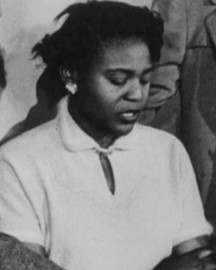Autherine Lucy Foster - The First to Break the Barrier
Born: October 5, 1929, Shiloh, Alabama, U.S.A.
Died: March 2, 2022, Lipscomb, Alabama, U.S.A.
Autherine Lucy Foster was a civil rights pioneer who stood up against racial discrimination in education.
Born October 5, 1929, in the small town of Shiloh, Alabama, she was the youngest of ten children in a family of sharecroppers. Sharecroppers worked on land they did not own and were often paid with part of the crops they grew. Life for her family was hard, and money was always tight. Still, her parents believed education was one of the most valuable things they could give their children. They taught them to work hard, be proud, and never stop learning.
From a young age, Foster loved school. She enjoyed reading and writing, and she dreamed about becoming a teacher. She attended several small local schools before moving on to Linden Academy for her last two years of high school. Linden offered stronger classes and gave her more opportunities to prepare for college.
After high school, she attended Selma University, where she earned a teaching certificate. She then worked as a teacher, but she also wanted to continue her own education. In 1952, she graduated from Miles College with a degree in English.
Foster and her close friend, Pollie Anne Myers, shared a dream: to attend the University of Alabama. At the time, it was one of the best universities in the state, but it was also all-white. Because of segregation laws, Black students were not allowed to attend. These unfair laws separated Black and white people in schools, public spaces, and transportation.
Despite knowing the rules, Foster and Myers decided to apply. To their surprise, both were accepted just nine days later. At first, they were thrilled, it seemed like a big step toward their dreams. But when the university learned they were Black, it canceled their acceptance.
The two women were members of the NAACP, an organization that fought for civil rights. They decided to challenge the decision in court. Two well-known lawyers, Arthur Shores and Thurgood Marshall, agreed to help them. Marshall would later become the first Black justice on the U.S. Supreme Court.
The legal battle lasted three years. During that time, Marshall won another famous case, Brown v. Board of Education, which made segregation in public schools illegal. In 1955, a federal judge ordered the University of Alabama to admit Foster, though Myers was not allowed to attend. The school claimed Myers had broken its “moral code” by being pregnant outside of marriage.
On February 3, 1956, Autherine Lucy Foster became the first Black student to attend the University of Alabama. But she was not treated the same as white students. She could not live in the dorms or eat in the dining halls. Still, she was determined to continue her education.
Just three days later, things turned dangerous. Riots broke out on campus. Over 1,000 people gathered to protest her presence. They threw eggs, shouted racist insults, and even attacked the car that brought her to class. The university president’s home was damaged, and threats were made against Foster’s life.
The university suspended her, claiming it was for her safety. But Foster and her lawyers continued to fight. They argued that keeping her out of dorms and dining halls was unequal treatment. They also tried to press charges against those who had taken part in the riots. Instead of solving the problem, the university expelled her permanently. They said her legal complaints were “slander.” The school’s president, Oliver Carmichael, eventually resigned over the controversy.
For almost 30 years, Foster struggled to find steady work as a teacher. Then, in 1988, the University of Alabama canceled her expulsion. The following year, she returned to the university to earn a master’s degree in education, the same year her daughter enrolled there. In 1992, both mother and daughter graduated together. Foster received a long, standing ovation from the audience.
In the years that followed, the university honored her in many ways. They created a $25,000 scholarship in her name, hung her portrait in the student center, and built a clock tower to recognize her life and courage. A campus building was renamed Autherine Lucy Hall to honor her role in ending segregation in Alabama schools.
Autherine Lucy Foster died in 2022 at the age of 92. Her bravery and determination opened doors for countless students. She is remembered as a civil rights hero who stood up for equal education, no matter the cost.
References:
Alexander, Kerri Lee. Biography: Autherine Lucy, www.womenshistory.org/education-resources/biographies/autherine-lucy.
Braddick, Laura. “Autherine Lucy Foster: The Life of a Legend.” University of Alabama News, 21 Apr. 2023, www.rememberravensbruck.com/caroline-ferriday.
Keywords:
Civil Rights, Justice, Courage, Perseverance, Freedom, Responsibility, Challenge Injustices, Face Prejudice
Explore ARTEFFECT projects about this Unsung Hero:
Autherine Lucy Foster Artworks
View Discovery Award projects about this Unsung Hero:
Autherine Lucy Foster - Discovery Award 2023
- Collections: Art Gallery, Unsung Heroes

